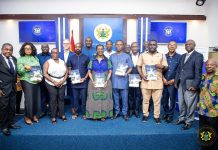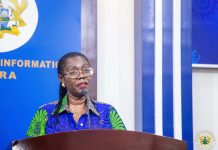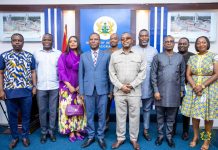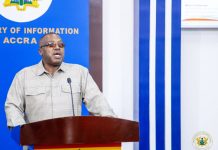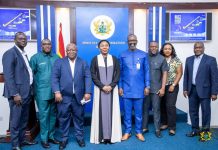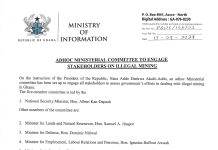The Chairperson of the National Media Commission;
The Vice Chancellor of UniMAC and Chairperson of the Technical Working Group;
The Chairperson of the parliamentary select committee on communications;
Presidents of the Media Associations;
The CEO of the Volta River Authority;
The Secretary General, Ghana Commission for UNESCO;
The CEO of MTN;
The Representatives, the Chinese Embassy;
The Members of the TWG of MCEP;
Staff of the Ministry;
Staff of UniMAC;
Invited Participants;
Distinguished Ladies and Gentlemen;
Good morning,
It is with profound sense of gratitude and excitement that we commence the 2023 edition of the Media Capacity Enhancement Programme (MCEP). First and foremost, I extend heartfelt appreciation to the organizers of this training program. This program is organized by a technical working group comprising Ghana
Journalists Association, Ghana Independent Broadcasters Association, Private Newspaper Publishers Association and UNIMAC. The Ministry of Information promoted this program as one of our media support programs in 2021. Our contribution has since then been to mobilize resources and urge on the stakeholders not to relent in their effort to continuously identify training needs, plan curriculum and administer this program.
To the stakeholder organizations and members of the technical working group let me say congratulations. Your tireless efforts will contribute to building the media environment we desire for our democracy.
Ladies and Gentlemen,
We are gathered here, both physically and virtually, for the beginning of the fourday intensive training program designed to enhance the skills of Ghanaian journalists and better equip them to deliver on the fast changing and demanding task of journalism in a growing African democracy.
This training is not just a routine training program; it is one of the most vital investments in the future of our media industry and our democracy. The media plays an unequaled role in shaping the national agenda and directing our energies and intellect towards various subjects. Today in Ghana nearly 700 radio stations have been authorized to operate, over 200 TV stations are operating and scores of publications (print and online) circulate. Unfortunately majority of us who operate as journalists on these platforms while being articulate and well intentioned, have not had the benefit of formal training as Journalists. The ethics, responsibilities, contemporary practices and nuances of the profession are not as widespread among operators as they should be. This is not just a Ghanaian challenge, it is indeed a global challenge. Indeed in the UK just a few days ago, major media houses were fined by the courts for very unethical media practices targeted at members of the royal family among others.
Knowing the important role of the media and knowing the challenges in the industry, it is imperative for various democracies to fashion out ways to support the media overcome the capacity and competition challenge.
In 2021 in Ghana, the Ministry of Information under my leadership resorted to collaboration of stakeholders as we always do, to fashion a Ghanaian response to this challenge. The commitment of our stakeholders is what has birthed the MCEP and our other four media support programs.
In Kumasi in 2022 under the auspices of Otumfour Osei Tutu, the maiden edition took place. Otumfour’s encouragement has been with us till today.
After the success of the maiden edition, a thorough evaluation of the technical working group was conducted. We further held a stakeholders review forum on the …………………………..in Accra, to flesh out ideas on how to improve the program. The feedback from both platforms will culminate in continuous improvements in the program.
Among other things, this has led to the mainstreaming the role of the University of Media, Arts and Communication to bring together the strengths of academia and industry players to strengthen the capacity of our practicing journalists for the future. In the coming years the TWG is considering including a component that trains trainers and also moves the training into media houses to make more impact.
To the participants of the program the modules in this program have been crafted to address the evolving challenges and opportunities in our industry. I urge each journalist present, to seize this opportunity fully. The knowledge and insights gained today will not only enhance your individual capacities but will also contribute to the collective strength of our media community.
We anticipate that you will not only apply the knowledge gained but also become ambassadors of excellence in your respective organizations. Go back to your newsrooms and organizations, not just as beneficiaries but as agents of positive change. Share your insights, train your colleagues, and collectively elevate the standards of journalism in our nation.
I want to also in particular thank our sponsors who have provided the finances and logistics for the training,
UNIMAC
MTN
Chinese Embassy
VRA
ADB
Ghana Commission for UNESCO
This may not be a flashy show that translates into immediate revenues for you. But I assure you this is one of the most important investments any entity can ever make. Investing in quality ethical journalism will help our democracy and in the long run, the business environment and your businesses ultimately.
Your support goes beyond financial contributions; it is a testament to the shared commitment to the principles of a free, informed, and responsible media. In this light, I further call upon our esteemed development partners to join hands with us in this noble cause. Your support is not merely an investment in the media; it is an investment in the development and progress of our nation.
I also want to single out my deputy, the Hardworking Fatimatu Abubakr for your industry and support on this program. I want to mention of my head of Programs at the Ministry Mawuli Segbefia and your team for braving this through despite the odds. And I want to thank the Technical working group led by yProf Quansah Aiddo of UNIMAC and Gloria Hiadzi of GIBA. We have fought a lot in this journey. But because we were committed, it has brought us thus far.
By the time we are done this week………….. journalists would have benefited form this program. That represents ……. Media houses that can potentially influenced by the lessons from here.
Ladies and gentlemen,
The Ministry of Information’s efforts to support the Ghanaian media are borne out of our mandate which among others requires us to develop policies and programs to support the public communications ecosystem.
In so doing our other media support programs include;
- Coordinated Mechanism for the Safety of Journalists: A response program to ensure the well-being and security of those on the frontline of journalism. Under this program attacks on journalists have received a decisive push for arrests and prosecutions in recent times. And on Friday December 22nd the Police CID, the armed forces and the Judicial Service will join us for the maiden accountability forum of the mechanism to assess how we have handled the incidents that have occurred this year and in recent years. I extend an invitation to you all to join us for this open forum.
- Collaboration with Stakeholders to Contain Egregious Media Content: A collaboration of regulators to sanitize the electronic media platforms and eschew content that is offensive while upholding media standards. Since our opening of the joint monitoring center of the NCA and NMC over ……..reports have been received and are due for the first hearing later this month. We look forward to seeing how the regulators; the NMC and NCA, will act on the offending media houses fairly, firmly and in accordance with law.
- Campaigns to Combat Misinformation and Disinformation: A proactive stance against the growing threat of misinformation, safeguarding the public’s right to accurate information. I am informed that on the 21st of December, Ghana’s national action plan to combat misinformation and disinformation will be signed off by stakeholders.
- Industry Support through Global Partnerships: A testament to our commitment to seeking global collaboration and support for the growth and sustainability of our media industry. Under this program, Ghana successfully bid for and won the privilege to host the Africa Headquarters of the International Fund for Public Interest Media. Its full operations in Accra from January 2024 will assist Ghanaian and African media extensively.
Today, these five programs stand as a muscle for stimulating a robust media ecosystem, representing the Ministry of Information’s unwavering dedication to the Ghanaian media landscape. It is heartening to see how collaboration, initiated in that forum at the Alisa Hotel in 2019, has borne fruit in the form of impactful programmes that serve the greater good of our nation. The strength of our collective efforts has been evident in the past, and it is this spirit of togetherness that will propel us forward into the future of media excellence.
Ladies and gentlemen, esteemed partners, and honored guests,
I end my speech by mentioning how critical this training is. In the lead-up to Ghana’s 2024 general election, the dynamic nature of media demands a commitment to continuous learning and professionalism.
Elections are a cornerstone of our democracy, and the role of the media in disseminating accurate, unbiased, and timely information cannot be overstated. To foster nation-building during such critical times, we must empower our journalists to rise to the occasion. Continuous learning becomes not just a professional development endeavor but a civic duty as well.
In essence, as we navigate the challenges and opportunities presented by an election year, let us reinforce our commitment to professionalism. Through continuous learning, innovation, and adaptability, we empower our journalists to play a pivotal role in fostering nation-building. The media, with its ever-evolving landscape, becomes not just an observer but a proactive contributor to the democratic process, ensuring that the information disseminated serves as a catalyst for informed decision-making and, ultimately, the progress of our great nation.
From the very commendable attention you appear to have given to these remarks, I am led to hope that you will participate fully in the sessions. By the powers in me vested, I declare the 2023 edition of Ghana’s MCEP duly opened. I thank you all for your keen attention.

